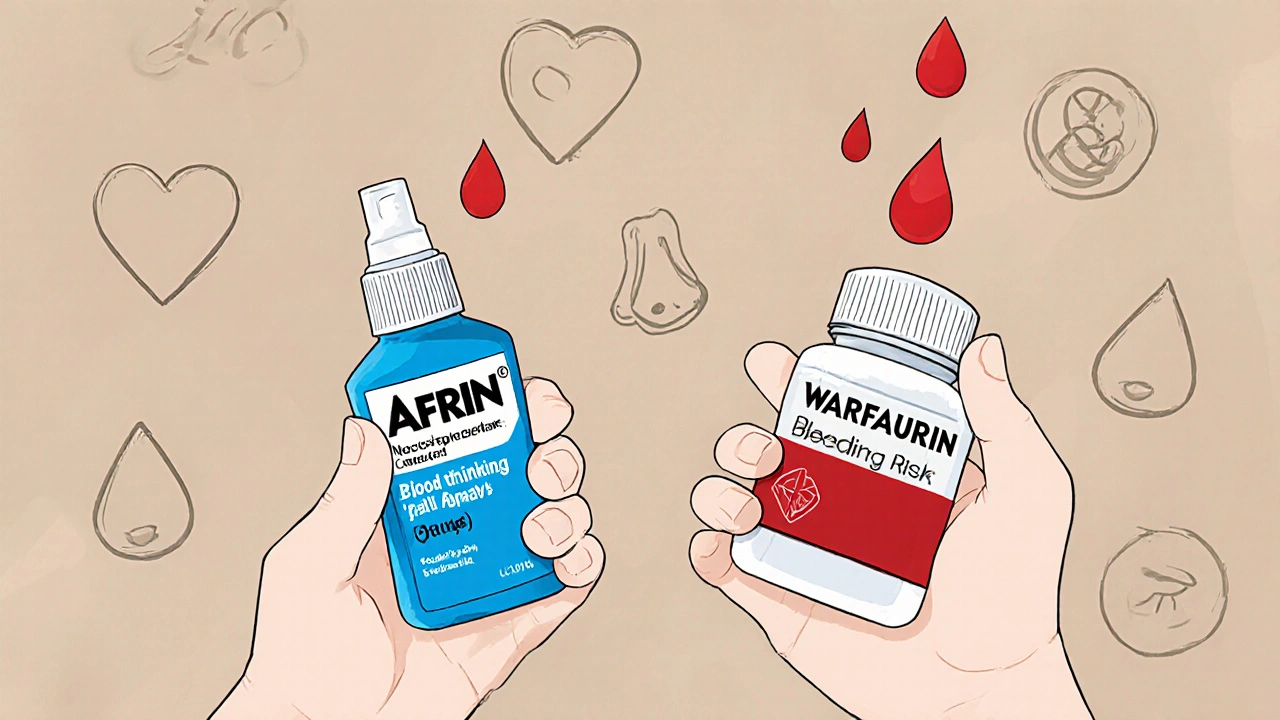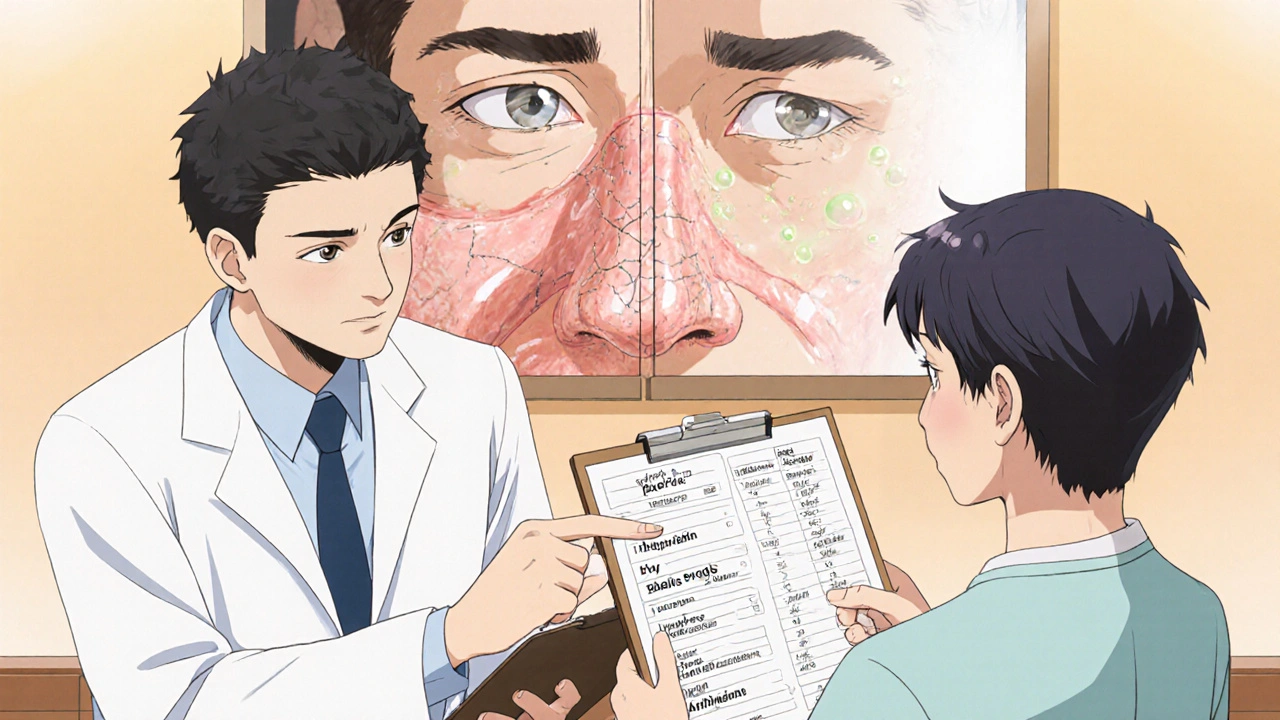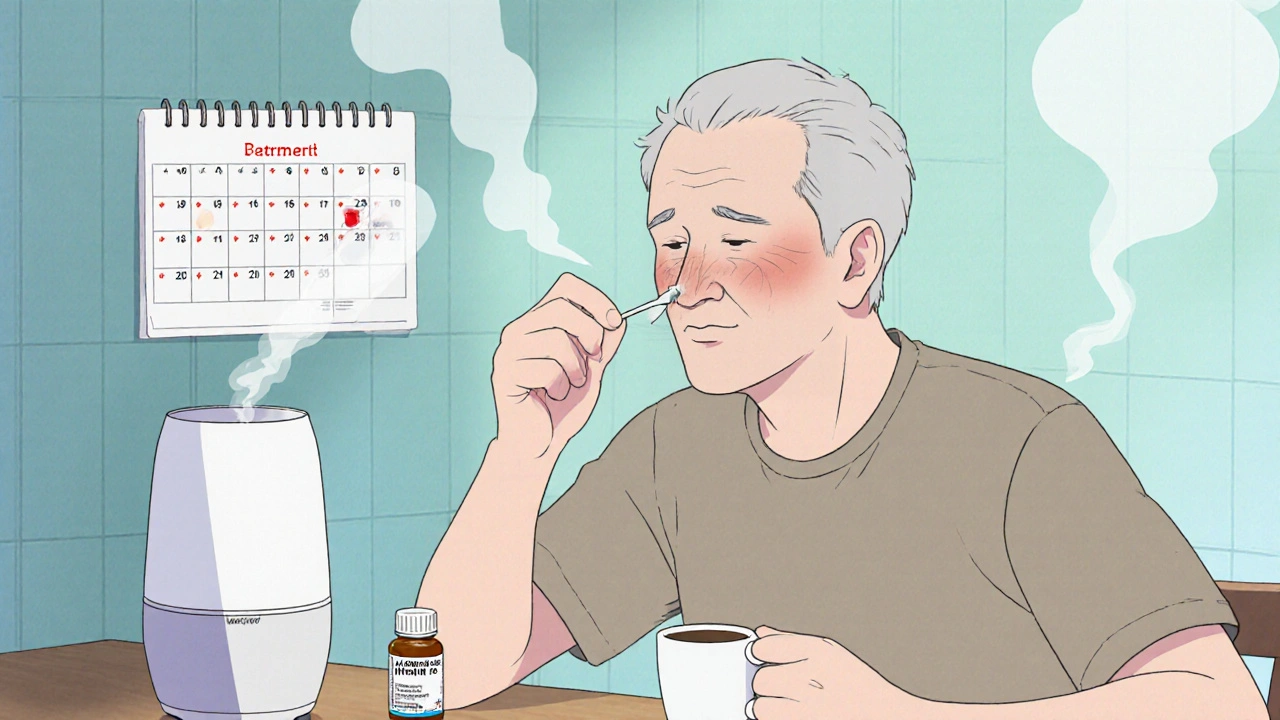Medication Nosebleed Risk Checker
Assess Your Risk
Enter your medications and lifestyle factors to see your personalized risk level for medication-related nosebleeds.
Your Risk Assessment
Most people think nosebleeds are just a nuisance-maybe from dry air, a scratch inside the nose, or a kid who picks too hard. But if you’re taking certain medications, your nosebleeds might not be random at all. They could be a direct side effect. It’s not rare. In fact, medications are one of the most common triggers for nosebleeds in adults, especially those on long-term prescriptions. And if you’re not connecting the dots, you might be missing a simple fix-or worse, ignoring a warning sign.
Why Your Nose Bleeds When You Take These Medications
Your nose has a dense network of tiny blood vessels, especially near the front of the septum. This area, called Kiesselbach’s plexus, is where most nosebleeds start. It’s delicate. And when certain drugs interfere with how your blood clots or dry out the lining of your nose, those vessels become easy targets. Two main mechanisms cause medication-related nosebleeds:- Thinning the blood - Drugs like aspirin, ibuprofen, warfarin, and clopidogrel make it harder for platelets to stick together and form clots. Even low-dose aspirin (81 mg), often taken daily for heart health, can do this.
- Drying out the lining - Decongestants like oxymetazoline (found in Afrin) shrink blood vessels short-term, but if used longer than 3 days, they cause rebound swelling and dryness. Antihistamines and some allergy meds have the same effect, leaving the nasal tissue cracked and prone to bleeding.
It’s not just one drug. It’s often a combo. Someone on warfarin for atrial fibrillation who also uses a nasal spray daily? Their risk jumps. A person taking daily ibuprofen for arthritis who lives in a dry climate? Same story.
Medications That Commonly Trigger Nosebleeds
Here’s a clear list of the most common offenders, backed by clinical sources:- Aspirin - Even at 81 mg daily. It blocks platelet function for days after a single dose.
- NSAIDs - Ibuprofen (Advil, Motrin), naproxen (Aleve), and ketoprofen. These are the go-to pain relievers, but they’re also top contributors to nosebleeds.
- Anticoagulants - Warfarin (Coumadin), rivaroxaban (Xarelto), apixaban (Eliquis). These are life-saving for many, but they increase bleeding risk across the board-including the nose.
- Antiplatelets - Clopidogrel (Plavix), ticagrelor (Brilinta). Often prescribed after stents or heart attacks.
- Nasal decongestants - Oxymetazoline (Afrin), phenylephrine. Used for short-term relief, but overuse leads to chronic dryness and rebound congestion.
- Antihistamines - Loratadine (Claritin), cetirizine (Zyrtec), diphenhydramine (Benadryl). Reduce mucus, but also dry out nasal membranes.
- Heparin - Can cause a rare but serious condition called heparin-induced thrombocytopenia (HIT), which leads to both clotting and bleeding.
Notice something? Many of these are daily medications you wouldn’t think twice about. That’s the problem. They’re not "dangerous drugs." They’re common, over-the-counter, or prescribed for serious conditions. But they still change how your body handles bleeding.
Who’s Most at Risk?
Not everyone on these meds gets nosebleeds. But some groups are far more vulnerable:- Adults over 45 - Blood vessels naturally become more fragile with age.
- People with high blood pressure - Higher pressure in nasal vessels means more force behind a rupture.
- Those in dry climates or during winter - Indoor heating drops humidity below 30%, making nasal tissue brittle.
- Pregnant individuals - Increased blood volume and hormonal changes cause nasal blood vessels to expand.
- Children - They pick their noses more, and their nasal lining is thinner. Even mild meds like children’s ibuprofen can tip the balance.
- People with bleeding disorders - Even small changes in clotting can trigger frequent bleeding.
If you fall into one or more of these groups and are on any of the meds listed above, your nosebleeds aren’t "just luck." They’re a signal.

How to Prevent Medication-Induced Nosebleeds
You don’t have to stop your meds. But you can reduce the risk-dramatically-with simple, proven steps.- Switch pain relievers - Use acetaminophen (Tylenol) instead of ibuprofen or aspirin when you can. It doesn’t affect platelets. For headaches, muscle aches, or fever, it’s just as effective and much safer for your nose.
- Moisturize daily - Apply a thin layer of petroleum jelly (Vaseline) inside each nostril, 2-3 times a day, especially before bed. Use saline nasal gel or spray twice daily. This keeps the lining soft and prevents cracking.
- Use a humidifier - Especially in winter. Keep one running in your bedroom. Aim for 40-50% humidity. Dry air is the silent partner in every medication-related nosebleed.
- Avoid nose picking or rubbing - Seriously. Even if it itches, don’t do it. Use a saline spray instead.
- Limit nasal decongestant sprays - Never use them longer than 3 days in a row. If congestion lasts longer, talk to your doctor. There are better long-term solutions.
- Don’t blow your nose hard - Gently clear one nostril at a time. Forceful blowing can rupture vessels.
These aren’t "tips." These are clinical recommendations from Dartmouth-Hitchcock, WebMD, and the Cleveland Clinic. And they work.
What to Do When a Nosebleed Happens
If you feel blood starting:- Stay calm. Panic raises your blood pressure and makes bleeding worse.
- Sit upright and lean slightly forward. Don’t tilt your head back-that sends blood down your throat, which can make you nauseous or even vomit.
- Pinch the soft part of your nose (just below the bony bridge) with your thumb and index finger. Hold it for 10-15 minutes. Set a timer. Most people think they’ve held it long enough after 5 minutes. They haven’t.
- Apply a cold pack or ice wrapped in a towel to the bridge of your nose. This helps constrict blood vessels.
- After bleeding stops, avoid bending over, lifting heavy things, or blowing your nose for the next 12 hours.
If you’re on blood thinners, even a small nosebleed that lasts more than 10 minutes needs attention. Don’t wait.

When to See a Doctor
Nosebleeds are usually harmless. But these signs mean you need help:- Bleeding doesn’t stop after 20-30 minutes of pressure.
- You feel dizzy, faint, or short of breath.
- You’re swallowing a lot of blood and vomiting it up.
- You have other unexplained bruising, gum bleeding, or blood in urine/stool.
- You’ve had more than 3-4 nosebleeds in a week.
- The nosebleed followed a head injury or fall.
If you’re on warfarin, your doctor may check your INR level. If it’s too high, they’ll adjust your dose. If you’re on NSAIDs, they might suggest switching. Don’t stop your meds yourself. Talk to your doctor or pharmacist. The risk of stopping a heart medication or blood thinner is far greater than the risk of a nosebleed.
Pharmacists Are Your Secret Weapon
Most people don’t realize pharmacists are trained to spot drug interactions and side effects like this. If you’re getting frequent nosebleeds and take multiple medications, bring your full list to your pharmacist. They can flag combinations that increase bleeding risk-like taking aspirin with warfarin or NSAIDs with antihistamines. They can also suggest safer alternatives or timing adjustments to reduce side effects.This isn’t about blaming your meds. It’s about working smarter with them. You need your prescriptions. But you don’t have to suffer side effects you can prevent.


This is so true. I was getting nosebleeds every week until I switched from ibuprofen to Tylenol. No more drama. 🙌
You people don’t get it. It’s not the meds, it’s the humidifiers. Everyone’s obsessed with humidifiers now. I lived in Arizona for 15 years with zero humidity and never had a nosebleed. It’s the damn nasal sprays. Stop blaming everything on the meds.
In India, we don't use nasal sprays like this-our nose is naturally conditioned by dust, heat, and chai smoke! But I agree: ibuprofen is a silent killer. My uncle had 3 nosebleeds in one week-doctor found he was on warfarin + Claritin + daily Advil. He stopped the Advil. No more blood. Simple!
The author ignores the fact that most of these patients are elderly and on 7+ medications. This isn't a 'simple fix'-it's a pharmacological minefield. And recommending Vaseline? That's not clinical advice. That's a TikTok hack. And don't even get me started on 'talk to your pharmacist'-most are overworked and don't know their own inventory.
I’ve been using saline gel + humidifier for 8 months now since I started Eliquis. Zero nosebleeds. Also switched to Tylenol for headaches. Honestly? Life-changing. 🤝💧
I know someone who had a nosebleed so bad they ended up in the ER. Turns out they were on Plavix and had been using Afrin for 6 weeks. Their doctor didn’t even ask about OTC meds. It’s scary how often this gets missed. Please, if you’re on anything blood-thinning-tell your pharmacist EVERYTHING. Even that fish oil you take.
This is why America is falling apart. We’re so scared of pain we pop pills like candy, then blame the medicine when our nose bleeds. Back in my day, we just held a tissue and dealt with it. No humidifiers. No gel. Just grit. We didn’t need all this overmedicated nonsense.
The physiological mechanism described is accurate, particularly regarding Kiesselbach’s plexus vulnerability. However, the preventive measures lack statistical validation. No controlled trials are cited to substantiate the efficacy of petroleum jelly application frequency or humidifier thresholds. A more rigorous approach would include reference to Cochrane reviews or randomized interventional studies.
Y’all are overcomplicating this. If your nose is bleeding and you’re on blood thinners or NSAIDs? You’re basically walking around with a tiny faucet in your face. Slap on some Vaseline like it’s sunscreen, crank that humidifier like you’re trying to grow orchids in your bedroom, and ditch the ibuprofen like it’s last year’s TikTok trend. Stop suffering. You’re not a martyr-you’re a person with a simple fix right in front of you.
This is just western medicine nonsense. In my village in Bihar, we use turmeric paste on nose and drink warm water. No pills no humidifier. Nosebleed gone in 2 days. Why you all so weak? Why you need so many medicine for nose? Just be strong like us!
The suggestion to consult a pharmacist is insufficient. The burden of medication reconciliation should not fall on underpaid, overworked pharmacy staff. This is a systemic failure of healthcare coordination, not an individual responsibility.